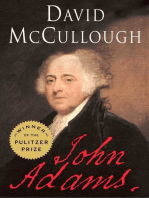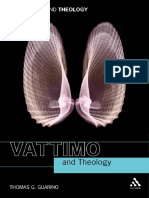100%(1)100% found this document useful (1 vote)
482 viewsAristotle and His Worldview
Aristotle and His Worldview
Uploaded by
Anonymous LnTsz7cpAristotle
History of Philosophy
Copyright:
© All Rights Reserved
Available Formats
Download as PDF or read online from Scribd
Aristotle and His Worldview
Aristotle and His Worldview
Uploaded by
Anonymous LnTsz7cp100%(1)100% found this document useful (1 vote)
482 views75 pagesAristotle
History of Philosophy
Copyright
© © All Rights Reserved
Available Formats
PDF or read online from Scribd
Share this document
Did you find this document useful?
Is this content inappropriate?
Aristotle
History of Philosophy
Copyright:
© All Rights Reserved
Available Formats
Download as PDF or read online from Scribd
Download as pdf
100%(1)100% found this document useful (1 vote)
482 views75 pagesAristotle and His Worldview
Aristotle and His Worldview
Uploaded by
Anonymous LnTsz7cpAristotle
History of Philosophy
Copyright:
© All Rights Reserved
Available Formats
Download as PDF or read online from Scribd
Download as pdf
You are on page 1of 75
ARISTOTLE AND HIS WORLD VIEW
‘Paar Brawtano
Ealited and translated by
Rolf George and Roderick M. Chisholm
UNIVERSITY OF CALIFORNIA PRESS
Berkey * Los Anges * London
Univesity of California Press
‘erly end Lo Angel, Calfola
‘Unive of aif Press, Lid
London, ngand
Copied © 1918 by The Reet of he Univers of Califor
ISBN: 020018506
‘Lirary of Congres Catalog Card Number: 76.5045
Printed United Sate of Ameria
Contents
Preface tothe Engi ation
Preface :
Life.
Writings
Wisdom
‘The Object of Human Wisdom -
Clarification of Terms
Immediate Knowledge
‘Two Classes of Immediately Evident Truths, the First of
Which 1s That of immediate Evident Fos «
‘Axioms
Mediate Knowledge
‘The Origin of Ideas
‘The Transcendence of Substantial Definition
‘Substantial Changes. Matter and Form
‘The Non-Existence of Continuous
Substantial Transformations
‘No Comiag to Be From Nothing,
and No Passing Away Into Nothing...
‘The Law of Synonymy
Existence of an Absolutely Necessary Being
tis Unmoved
‘There Exists a Single, Purposeful Intelligence
‘a8 First Cause of the Entire World Order
‘This Intelligence Is the First Cause Not Only
‘of All Order but Also of All Being
In Contemplating Itsef It Is All-Wise and
‘Wholly Blissful, and Its Nature Is Its Wisdom
and Its Wisdom Its Biss ......
‘This Intelligence Is the Love of All That Is Good
‘nd the Almighty Will That Wills the Best
CconTENTS
111s Infinitely Good and Is Principle
»
Becaselt Is Good . »
TheDUW seescvercsciguenecegte
‘vote’ Deity and dhe Platonic tn of .
he Good, The ‘Desite” of Malte =... %s
‘Assos od and the Now of AnagD"
‘Nes ety inte Lito Hs Dstie ‘
Sete Peingpes of PII oan
cod sre Act HisPurey TheorealLite =. 86
$e Duy andthe Alleged Impossby of x
Dred WI gee »
pitas associated With Theodiy =.--- FS
helio ofthe Clstil Wo:
Te Coroptble Elements and What Leads
‘ete! Uatoing of Tee Power ts
rea ing and Anisating inden ofthe Sars 105
‘he Endl ae Anan
cesaear it Speory of Man THooa
tant Ilan Naar oe
Inureton Been Mind and Boy
‘ras hae inthe Crean of
re Rovtarenes of Man, The Funes of Tie
Te Wid ar Preption forthe Ward eso
eed Barton Commee
tall
il rw a th aia God
vane Pro ration of the Life Made Blissful
Tnfinite Protifers
{nits Wisdom through God... .+..0<:0s-02 2
‘TeleologicalIndispensabiity of the Physical World...
Coneiuding Remarks.
“Aristotle's Philosophy Compared om
With Other Word Views wvoseessvsseeesessneee Be
Abbreviations to Notes pe Be
Notes I im
Index
Preface to the English Edition
Franz Brentano (1838-1917) is best knowa for his Paychology
rom an Empirical Standpoint the first edition of which was pub-
lished in 1874, and for his subsequent writings on metaphytics,
ethics, and descriptive psychology. But throughout his life he was
‘concerned with the philosophy of Aristotle. His first two books
dealt with Aristotle's ontology and with his psychology, and in
particular the doctrine of the so-called active intellect, These were
Von der mannigfachen Bedeutung des Seienden nach Aristoteles
(1862) and Die Psychologie des Aristoteles (1867). In Brentano's
Scientific Nachlass there are more than 180 unpublished manu
scripts and dictations pertaining to “Aristotelica.” He published
five books in addition to articles and reviews, on Aristotle's philo-
soph. The last of theses the present book, Aristoteles und seine
Weltanschauung (1911), published six yeas before his death."
Brentano here sets forth what he takes to be the essential fea
tures of Aristotle's philosophy and to present them as a unified
whole. He begins with Aristotle's ontology and his theory of the
‘manifold sense of the term deing; then he discusses theory of
‘knowledge and in particular Aristoue’s conception of what Lelb-
nia was to call ‘the first truths of fact” and "the first truths of
reason’; then he discusses the concepts of substance, matter, and
form; and finally he turns to Aristotle's theology and his theory of.
‘man, The latter parts of the work are admittedly speculative.
The book might wel have had the subtitle, “Aristotle's theory
of philosophic wisdom.” Perfect happiness, according to Aris
totle, is an activity of intuitive reason, To the extent to which a
‘man is capable of such an activity, something divine is present in
him. “The activity of God, which surpasses all other in blessed-
ness, must be contemplative; and of human activities, therefore,
that which i most akin to this must be most ofthe nature of happi-
ness.” But when we ask “What isthe object of divine thought?”
vi [PREFACE TO THEENGLISH EDITION
caer escelent of things), and its thinkin isa thinking on think-
Jha" Brentano belives that Aristotle had put off the final state:
ae tof his theory of wisdom, presumably because of its great di
Foulty, and that f we are properly to understand Aristotle's philo-
Sphy we must reconstruct the theory from what evidence here i
eellable, The essential features of Brentano's own reconstruction
pertain to the nature of God and of man.
“Aristotle states explicily that God is ‘the first principle or
primary thing" In knowing himself, therefore, God knows the
Prumave ground of the world, This means, according to Bre-
{ano’s interpretation, that God has a priori knowledge of the
teotid asa whole and ofthe necessity of every detail. Brentano de-
Tous te view that, according to Aristotle, the world isthe best of
‘AT possble worlds and was created by God. “Paris of i,” Bren,
aano nites, "may seem to be defective when they are considered
‘Bart from the whole, But once they are viewed in connection they
spain to be eaicely as they ought to be.” Brentano gives &
Siausble Interpretation of those passages in Aristotle that may
Team to ruggest the contrary. This reconstruction of Aristotle's
Theology is not accepted by most contemporary commentators,
‘pur it seems to have been shared by Theophrastus, who was Asx
fotle’s successor as head of the Peripatetic school.
th Die Paycholople des Aristotele, Brentano attributed to
“Aristotle a version of “creationism,” the doctrine according to
‘hich God plays an ative role in the creation of each individual
human being. There followed a long controversy between Bren
favo and Eduard Zeller. Brentano's final detailed statement of
hat ne t90K to be Aristotle's creationism may be found in bis
“Whstoteles Lehre vom Ursprung des menschlichen Geistes (Leip-
Be tol, His view, which was modified to certain extent as @
Ae tof Zellers critic, is summarized and defended here. It is
‘ecntially this: (1) a buman being isa unitary mental and physical
‘hing, @) with respect tothe intellectual part of his soul the so-
talled nous, man is incorporesl and capable of surviving the de-
Struct of his body; G) tis impossible for such a being to come
{tro existence without the active cooperation ofthe deity; but 4)
the nous does not exist prior to the cretion of man nor does it
[PREFACE TO THE ENOLISH EDITION *
ee een
Ce ea a
‘nature the soul is, comes into being”). The latter point is properly
ee a
eee aes ee a
Cee ea a oe es
a ieee tera
peptone reenter ep
Siraaaina deta preter sees
asbestos
accord with that of Theophrastus. eta °
Brees
Seen ees
cranes eet eS
pete lepine
ee od te ee
Roderick M. Chisholm
Preface
According to Aristotle there is no knowledge that surpasses in
value and dignity that which he calls “‘wissom.” He even thinks
that ints contemplation we partake inthe highest bliss of which
‘maniscapable at all. So far all commentators agree. But then they
proceed to expound what Aristotle teaches about wisdom, and put
Forth something so disharmonious and full of palpable absurdities
that one cannot help being taken aback.
‘his alone raises suspiclon; more so the whole manner in
which they go about ascertaining what Aristotle's doctrines were.
[in thei researches they meet with statements that eppear clearly
to.contradict one another, they assume at once that actual incon-
sistncies were taught. Thereafter they merely ask which version
fone should adopt in hs interpretation. Bu itis not very farfetched.
to suppose that those passages can be given a sense that brings
them into agreement, so that what was fist an obstace to under-
standing now actually serves to facilitate it. For the necessity of
‘doing justice to several apparently conflicting claims at one and
the same time is an important touchstone for the interpretation of
‘each individual claim. More than that, to expin the connection
Of one statement with another we may have to supply certain
‘mediating inks, and thus the whole of Aristotle's doctrine is re-
vealed in much greater completeness.
“This isthe road I myself have chosen. I think that by using
incidental remarks from various works [ have come to a result
whieh recommends itself through its homogeneity and also be-
‘cause it leads one to understand why Aristotle could rest with such
high satisfaction in the contemplation of a world view so struc-
tured.
It fs true that what Aristotle teaches about wisdom is no
longer tenable as a whole, and some parts seem to be entirely
dated, Stil, Tam convinced that if it is properly understood, its
study can truly entich us, even today. As a youth I began to con-
ry PREFACE,
‘cern myself with philosophy ata time of grievous decline, 1 merely
repay a debt of gratitude when I admit that Aristotle, more than
any other teacher, introduced me to suitable methods of inquiry.
It was of course necessary 10 combine his bequest with a great
‘many later scientific achievements. For this reason much, if not
everything, received an essentially diferent cast. But even today 1
could subscribe to lines I wrote in the album of one of my students
atthe University of Vienna when he kindly requested them:
You who clam noble dsc, Nest whe my ancetor were!
{am of Socrates eed through whom Pio cane nt beng.
Plato beat be Stage whore rength be never abated,
[Nor har faed the Bride whos: be ses a tove
‘Two milena have pased bt the mariage ll rengthns and Brome,
ven fda I can cai hat 1am oft ie.
Weome Boden, you poss, welcome O bother, end You,
Godin ech, TReopvat, ret a the Laban woe
Since mr gen him lt, youngot of al hs descendents
Loves my father me most more tender than alte ote. =,
‘The many resemblances, even agreements, between Aris-
toile's doctrine of wisdom and that of our grest Leibniz are in
themselves very instructive, The latter's high-minded optimism
has been much chided, but now the significance of his teaching
begins to be more appreciated. It can only be conducive to this
understanding if one sees that the greatest representative of
ancient Greek philosophy maintains and defends the very convic-
tions that this eminent modern thinker taught with such force and
Jn which he saw the foundation of a life of true human dignity.
T sought to condense my presentation as much as possible,
But since in many respects it stands in pronounced contrast tothe
‘now customary interpretation, { could not always avold more de-
tailed demonstrations and refutations of the main objections.
Indeed, I should have had to go into even greater detail i I could
‘not refer for some ofthe most controversial tenets, e.g, the doc-
tine of the ative intellect [nous polétikos, the activity of Aris.
{otle's god, the sou of man, and the origin of the human race, to
the relevant discussions in my Psychologie des Aristoteles and my
essay Aristofeles Lehre vom Ursprung des menschlichen Geistes,
whichis just being published,
Franz Brentano
Life
‘We count researchers and scholars among the great benefactors of
the human race, but some more than others, ether because they
were engaged in richer and more variegated work, or ter fd
‘was more eae, or else because they had greater substantive sc
cess, or thir influence upon contemporaries and pesterty was
wider or more profound. There is perhaps no one who, forall of
these reasons asa restr im fo grateful everence han Ae
tall,
"He was born in Stageir, a Greek colony in Macedonia, in 384
‘3. Aviso’ father and earlier ancestors had served as personal
‘Dhysicians to the kings of Macedonia, but he could more justly call
Athen his intelectual home. He first entered it as. youth of ser-
teen, not to leave it ntl weny years ater, and then ony for
lle more than a decade. He received his entire inition into the
seienes in Athens there he was fst active as teacher, and it
seems that ll his writings that have come dow tous wee writen
there,
His mind was open to all the noble influences that Athens
could then offer. Ba he was atracted chiefly by Plato, whose
school he sought out at once, and whose influence upon Aris.
tote’ theoretical as well as practical philosophy is far more ec
dent than anyother, inspite of the careful attention tht Aristotle
later pai to earlier philosophers, pariclly ofthe lonian school.
‘There is also no doubt that he always flt deep gratitude toward
Plato. Thus Olympiodorus mentions an epidelctic speech that
Aristotle wrote in Plato's honor, and be aso excerpts passage
from anclesite poem in which Aristotle commemorates hs fiend
Euderus, the Cyprian, which combines the expression of highest,
mization forthe stil iving Plato with praise forthe noble dead:
Wie ie came to than ni hy of Kleope
‘pial ied an stare Prenat
fer ma whom Then or nt low men ren tra
. oral to how ary,
Yet veg nr cond of an gh cpl sot,
{Sa coe! hae ath eds o both ar ad hapa
‘et oa day pope os ne ee?
‘And this feting of highest admiration never ceased. No one
can more sincerely profes his unending debt of gratitude to the
teacher who first intoduced him to wisdom than Aristotle dd et
theeve a his ie inthe books on friendship, He sys tha this case
is much ike the benef one reeves from his parents and from
Alvin providence, which ean also never be fully and properly re-
Dal Tt appears that in his earliest wrlings he followed Pato
lost completely; but later, inspite of his sentiments, be opposed
himin many important poise explains this with he beeraful
word tat trath must be a dearer friend than anyother, even the
rnost inmate nor ye, for the sake of truh, inst we spare our
‘own opnioae} hus the frank eritam that he did not hesitate to
advance agit Plato himself only does him honor even ft pro-
‘ied Epicurean baskbites with an opportunity for slanderous re-
‘harks which makehim as well ax Plato appear ina most unfavor-
able light.
{eis an empirical fact, occasionally metioned and explained
‘by Asstt himself, that man is moved to love more by beaefts
he as bestowed than by those he hat received. Ths we eannot
‘wll doubt that Aristotle always maintained deep sympathy for
‘Aleander the Great, with whose education King Philip had en-
‘tasted him, and whose mind and sul he had infenced in many
sand most beneficial ways. Agua, this dd not induce him 10
spprove in every way of Alexander's actions as a ruler, Inded,
‘upon careful crutay one can hardly fll o appesat that many
important points nh books onthe ate sem to have een ad
‘vanced specially to characterize Alexander's ss as fale and
‘blameworthy. Bent oa conquest, Alexander pursued nothing but
war and ever greater expansion of his empire. But Arsole de-
clares that all sates whose intitatons are designed mainly witha
‘ew to war are il conceved in principle, and he wars against &
Times expansion of the stat. For in contrast othe det, whose
setvty ie eapable of ordering the immeasurable universe, man's
‘ower islimited, Thus he olds tha th tat, salar to every Kind
of organism, bata cetain relatively small natural size beyond
ure 3
which an increase is no longer a change forthe better but leads to @
lessening of perfection. Finally, Aristotle's and his ancestor’ per-
sonal testo the royal house of Macedon did not keep him ftom
claiming hereditary monarchy tobe il suited to the welfare ofthe
state.
Astotle led an eventful life. He carly lost his father and
‘mother, but was fortunate to find loving foster parents in Proxe-
ros and his wife. They guided hs first steps on the road to virlue
‘and managed his not inconsiderable patrimony falthfully, He sil
commemorates them gratefully in his testament. After Plato's
death he followed an invitation to Atarneus by its ruler Heri,
There he witnessed the sudden fall and demise ofthis noble fiend.
He spirited away and thus saved Hermeias’s_
‘auebus: Pthes, whom he lier married He soon lot Be, 100,
fé mentions her affectionately in his testament even though he
hhad-aMerward fo 7 is of Stageira
There are some who would have us believe that this second
union was nothing but a conevbinage. But however the social pos
tion of Herpyilis might have differed from that which Pythias had
‘once occupied, we must not think of the kind of relation we now
‘tend to designate by that name. It implies an injustice against the
female partner which wholly contradicts his well-known sense of
Justice and friendship. Itis likely that Herpylis, who bore his son
‘Nichoms
ionst
‘ment a clause concerning the future welfare of his widow which is
‘most important in this connection. He says thee that she should
again be given in marrage if she so desited, but only toa husband.
‘worthy of him. We can fee that for his second union, too, there
‘must have existed a sanction, above ll one of conscience.
In general, his testament contains much that brings us closet
to his noble personality, particulary certain decrees concerning
the slaves he left behind, n his Ethics he demanded that we should
see ina slave not only the slave, i.., a kind of living tool, but also
the man. The passages in his testament show that his own conduct
‘vas in full harmony with this doctrine.
Evenstortly hefore his death Aristotle suffered great misfor
‘glean ech. tht Aleandr aes 20
‘ ure
ied and the news reached Athens, Aristotle whose heart was so
‘ath and OF ev suffer the gravest
Ingratiie from this city in whose behalf he had repeatedly used
Hs influence at the cour! of Macedon. There isan extat Poem
that eulogize his dea friend Hermelas a the reflection of all vir
te, On the basis ofthis poem he was accused of venerating a man
48 god. Knowing the pasion of the masses, Arstode led the
teal and was indeed sentenced to death in absenria. He had re-
mained completely aloof from Alexander's government, bat this
id not prevent the outbreak of long suppresed hatred against
“Macedonian rue from turing against the great Stagiite as well
(nc has contrasted this lack of any attempt to influence Alex.
anders polices which Plato's atitude, who repeatedly traveled to
Syracuse in order to reform that state according to his principles.
But itis ertainly © mistake to explain this fact from Aristotle's
preference for the contemplative as against the practical ie. Pre
lily the same attitude can be found in Plato as much asin Aas.
toile. And Aristotle was explicily-of the same opinion as Plato
‘hen he held thatthe her must nonetheless concer him
self with the administration ofthe state, since things wil not be
Sieh in the state untl either the philosopher i King or the king
plillorophizes in the right way. And so there can be litle doubt
that he would have sacrificed some ofthe cherished contemplative
life had Aterander boen inclined to listen to the precepts and
advice of his teacher after he had become ruler. Ii certain that
this advice would not have deviated as much as some of Plato's
‘evolutionary ideas from ways that experience has shown to be
practicable, Had Aristotle attempted from the outst to confine
imoeff only to inquiry, fhe had had uo desire to influence pli.
cal conditions, why did he accept King Philips invitation 0
cagerly? Afterall, Alexander was tobe edicated fo become guacd-
ian of the state, nota scholar. Iti alo very unlikely that he
accepted Philip's offer because ofthe gal he could expect, but
rather because it seemed to him more promising to win the heart of
8 young prince than to move the mind ofa ruling tyrant to asrept
bis political ideas, as Pato had hoped todo.
‘Avisie ied inthe summer of 322 5c. atthe age of sixty.
‘wo in Chalkis on the island of Eubea, which had granted Rim
refuge. His sehoot was called the Peripatetic from the covered
ure 5
walkway (peripatos) of the Lyceum, which it occupied. Under his
‘own leadership as well as under that of his immediate succesors,
the firs of whom was Theophrastus, it far outshone the Academy
under Speusippus. Eudemus, the author of the Ethics named after
him, ago needs to be mentioned as the most outstanding of Aris
tolle’s immediate disciples,
Writings
Let us now turn to the writings of the great man.
Hee had already taken his first steps as an author during
Plato's lifetime, and in those days he often patterned his exposi-
tion after that of his teacher. He wrote several dialogues of which
only insignificant fragments have come down to us. The attempt
‘toemulate Plato even inthe beauty of his exposition was a danger-
(ous undertaking. But it scems that Aristotle acquired many of
Plato's stylistic virtues, even if he did not quite reach the same
level. We must suppose that it was these no longer extant writings
that prompted Cicero to praise him for having, second only-to
Plato, the most accomplished mode of exposition, aesthetically no
Jess than didacticlly, ofall the ancient philosophers, The extant
‘writing, however, eave much to be desired in point of style (and
the most important among them ate the worst), even though the
terseness and pregnancy of expression gives them often a certain
serve ul ie om hr ernie ne, Teac
annoying repetitions; an explanation that ought to have oct
such sooner comies dragging long much too late; and even elar~
ity, the reader's first requirement, is only most unsatisfactorily
observed. Sometimes a passage becomes incomprehensible
through exaggerated brevity, sometimes because of ambiguity of
expression. It not only happens that. Aristotle uses a given word
now in one sense and elsewhere in another; he permits himself
such a change of meaning even in the context of a single expla-
nation, indeed the same sentence
Itis particulary regrettable that the exaggerated brevity that,
we criticized tends to be especially conspicuous where the most
important and most difficult questions are concerned, a circum-
stance that already in antiquity led to very strange opinions. It was,
taken as an indication that he wanted to be incomprehensible;
Some thought that he did not want certain lofty truths to become
‘wITiNos 1
common property, but wanted to reserve them for his school.
(Others suspected him of having been uncertain himself; and that
he, rather than simply admitting this, tried to protect himsel!
‘against posible criticism and refutation inthe manner ofa ctl:
{sh Le, by surrounding himself with artifical darknese. Thoveh
these assumptions are incompatible with Aristotle's character 3
we know it, and thus altogether unlikely, they are an eloquent
testimony othe lack of clarity which we have eritcized. Also, the
sreat number of variants in the extant codices show the tent fre.
Auently to be uncertin, and its clarity could not but suffer by the
‘various mistakes that crept in Often a commentator finds himself
Prompted to emend text even ata point where the vatious other-
‘wise divergent codices agre; and such an emendation can be cor
Feet even if it nterpolates “not” (ou) and thus changes the sense
‘of the passage into is exact opposite
‘We cannot properly hold the author responsible for this, ex-
¢=Pt perhaps tothe extent that a text whose dark style makes it
incomprehensible to the copyist is particularly liable to be cor.
rupted by mistaken variants. In general we wil judge the lack of
larity andthe othe shortcomings in Aristotle's manner of expos
tioa les severly once we notice whet and How the exiant wiitngs
‘SEE COMPORET. We are at present reasonably unanimous in the
assumption hat they all fll into his second Athenian period, Le,
in the years 335-322. The shormes of this time contrasts strongly
with th astounding wealth and variety of the works which eame
then into being. They include not only the extant bu also Some
lost works, in particular the great work that contained a historical
description of the most important ancient constitutions. One
‘ought to consider, moreover, that Aristotle's time was divided
between writing and lecturing. What i known of the pubic events
‘of the ime and his own private lfe must have greatly interfered
‘Also we are told that be was of delicate health. Under these ei
cumstances itis easily understandable that Aristotle, inorder to be
able to fulfil the more important aspects ofthe great task that he
hhad undertaken in the service of mankind, dd nt go onto develop
fully the alent for exposition to which bis etly writings attest.
[None ofthe extant writings were published by himself; and
‘one of them seem truly finished, though some seem much farther
{rom completion than others tis possible that some were used a5
5 wwarres
lecture notes; some of them frequently, others not s0 often. A few
Ihave so much the character of preliminary sketches tha they could
rot have sufficed even for that.
‘All this makes a secure understanding of his doctrine very dif-
ficult, These difficulties would become even greater if we followed
some highly regarded critics in taking it for granted that Aristotle
often says things thet he himself does not believe, According to
thes critics he sometimes made extreordinary concessions to com
‘mon opinion against his own indubitable convictions. It is also
allege that i he could hope to sway an audience against an adver-
sary by charging him with a certain opinion, he did not hesitate to
do so even if he himself subscribed 10 it. Then again it is sald that
‘he was inclined to put his dialectical skil in better Hight by piling
reasons upon reasons through attacking even from postions that
he did not himself occupy. Some take these Literary sins to be 50
undeniable in Aristotle that they erect a complete system of me-
thodical rules upon this assumption, which must be strely sb-
served if Aristotle's doctrine is not to appear as a heap of contra-
dictions. They even go so far as to claim that when he makes inc-
dental use of a thesis, even if he derives important consequences
from it, hsstatement snot as reliable asin another content where
the is concerned with ascertaining and substantiating the thesis
‘elf I true, this would have very sad consequences in view of the
Aificulties that can result from the obscurity of his syle and the
defective transmission ofthe text. Fortis natural that only afew,
perhaps only one, passage wil be concerned with substantieting &
siven thesis, while occasions for application reeur frequently. The
thesis, moreover, if it is far-reaching, can possibly determine in
art the character ofthe system inal essential aspets. Obviously,
‘careless expression or a corrupt reading can much more easily
‘make one pascage misleading than uniformly falsify a great many
cof them. As a matter of fect, this principle of interpretation has
led to the rejection as evidence of a much larger number of signifi-
ant passages that agree with one another and which stem from
various different writings, only because they conflict with a certain
interpretation of a very small numberof other passages.
Fortunately, after long and careful study of Aristole I can
warrant that these antecedently unlikely hypotheses are without,
‘ny foundation and only derive from misintecpretatons that are
‘WRITINGS °
‘ot too surprising in view of the difficulties of comprehension
have already mentioned. Thus we shall make no use whatever of
these hypothetical aids. If we nonetheless azrive at an equally har-
‘monious interpretation, then the rules of probability wil place the
_reater likelihood on our side, especially since we did not make use
of such complicated presuppositions. Our case is strengthened
‘even more since a comparison reveals that their.contrivedassump-
tions led those expositors to doctrines that have much less internal
‘coherence and are less closely related tothe doctrines of Aristotle's
historical predecessors and successors, andthe views ofthe great
thinkers of other ages who have otherwise much in common with
him. Indeed, these doctrines seem so palpably absurd that prob-
ably no man who interpreted Aristotle inthis way ever had any in-
ination to espouse his views. One can also demonstrate that ne!
‘ther the immediate successors of the Philosopher, nor Alexander
‘of Aphrodisias, who about a.p. 200 acquired the honorific ttle of
fn exegete in the most eminent sense,’ nor Simplicius, the most
Jearned of the ancient commentators who counts Aristotle next to
Plato asthe highest authority, nor the Arabie philosophers, nor
‘the Schoolmen, to whom in Dante's words Aciatotle was the "mas-
ter of those who know,” were inclined to the sort of Interpretation
at which our hypereritical modern exegetes have arrived. On the
other hand, we find ths sort of interpretation with Ramus. Tt is
well kmown that Ramus even broke with Aristotle's logi; on the
basis of such hitherto unheard of exegesis he hoped, in addition,
to ruin Aristotle's reputation as a metaphysican, One would
accordingly have to say that the mighty influence of the Aristo-
‘elian writings even in the highest spheres of philosophy was acti-
ally due to a misunderstood Aristotle. Thus we see that Leibniz,
‘already misled by Ramus, attributes to him relative to even the
‘most exalted questions views that are in keeping with the modern
Interpretation and, as a consequence, speaks rather contemptu-
‘ously of Aristotle's doctrine of God. He war nonetheless much
influenced by Aristotle even inthe highest field of inquiry, but
‘only through mediators whose teacher the Philosopher had been
‘and who had understood him differently. How altogether differ-
ent would it have been had he known Aristotle's true teaching!
‘With how much delight would he have called attention to the lose
‘agreement in many tenets. And because ofthis modern obscura
» ‘warrinos,
ton of Aristotle's doctrine, the present age, much as Lelbniz, finds
itself robbed of an immediate and most beneficial influence expe
cially in the highest field of inquiry, so that his suthorty is now
‘noticeable only in relatively lower disciplines.
One must not be hasty in taking apparently incompatible
propositions of the Philosopher to be truly contradictory, then
"eject one set as less trustworthy, and finally palate this strange
procedure by means of even stranger hypotheses. If one does not
‘thus sidestep these problems, then the very difficulties in bringing
about agreement will enhance the value of the chies that heve thus
been saved, and here, 10, to speak with Aristotle, the aporia (dif.
‘culty] becomes an euporia [advantage]. The reason fortis is that
‘we will of course search forthe conditions under whieh the various
utterances appear compatible with each other. Thus a given pas.
sage brings to light not only the correct interpretation of another,
italso enhances the understanding of many branches ofthe Aristo.
tclian system which in his often terse and fragmentary forma.
tions are nowhere explicitly expressed, but are required to generate
cohesion. The thought-structure ofa great thinker is like the orga-
nism ofa living being where each part depends on the other in its
constitution. It must often be quite possible to do with such a
philosophical work what Cuvier did go well with the remains of
Prehistoric animals when he precisely determined the natue of the
missing parts from the nature ofthe given ones. And once a fuller
‘understanding ofthe true character of the whole hasbeen reached,
0 that the kinship of this thinker with others, whose works are
‘more fully preserved, has become undeniable, the consideration of
‘these other thinkers will give us further aid and will lead us more
readily to grasp one case in analogy to another.
All this willbe our task, and we hope to be able inthis way to
provide a much more complete picture without overstepping the
limits of probability. Moreover, no sympathetic ert wil re.
‘roach us for being not exact enough to long as we always indicate
‘whether something was Iterally stated o infered with certainty,
or else added as a more or less probable conjecture. Of course i
‘sing such new aids we wil not deny ourselves any of the methods
‘used by others; and will even attempt to use them more extensively
and carefully.
‘Asa consequence of the above our task has been much ex:
‘warriNos "
tended. For this reason and because not much space is available we
‘must attempt to restrict t as much as possible in another respect.
emus sufice if we represent all major tenets of only that part of
Aristotle's doctrine which he himself comprehended under the
zname ““Wisdom.”"
‘Let us at least briefly touch upon the question of the chrono
ty of Aristotle's writings and the characteristic peculiarities
which distinguish the so-called exoteri writings from those ealed
‘esoteric. This chronology would seem to be highly important for
understanding and matching individual passages, especially if we
could find clues fora development of his doctrine. A very gradual
evelopment of Plato's teaching cannot be denied. Is it unlikely
that Aristotle, too, was prompted to make changes? This was cer
tainly the case if one includes the time when he wrotehis dialogues,
ven the few extant fragments testify to this, Oa the other han, it
‘is generally claimed that there are almost no changes in theory in
‘the systematic writings that have been preserved. This ip attributed
partly tothe fact that they were composed within a short time of
‘one another, partly tothe possiblity that Axstotle took eareafter-
ward to make certain corrections in these writings, none of which
he published himself. But a thinker who was not 0 foolish as to
claim the certainty of mathematically established propositions for
all of hs assertions, and who moreover spoke with all humility of
‘the imperfection of human wisdom, can hardly have failed, in 2
span of twelve yeas, to conceive certain reservations and attempt
some reforms, And while small changes could easly be made after
Ward, the same does not hold for alterations that required far
reaching restructuring. We find that supplementations that Aris
fotle found necessary are not worked into the body of a writing,
but are loosely attached at the end. Sometimes even several such
appendices follow each other casually and without inner order.
Now that he was engaged upon other questions he would and
could take no time for more than this. And how could he have
found this time if not @ mere supplement, but a correction thet
could not have been carried out without considerable reworking,
was demanded. Not even a Saint Augustine would have found it
appropriate to write a book of retraction (ashe had done for his
‘own publications) for writings that had not even been published.
But, it willbe said, what isthe point of all these considera.
a ‘waITINes
tions since we know from experience that no such revisions occur
in Aristotle's systematic writings. Just this, itis claimed, makes it
nearly always impossible to ascertain their chronological sequence,
‘but that under these conditions this does not appear tobe a serious
shortcoming. But here, too, painstaking comparisons have per-
suaded me of the contrary. Theres especially one very important
_Point-on-which-Ifound a whole series of successive changes in
‘Asitotitisthe theory of dein, wih epi in ier
it ways in the Tope, the Paserlor Anais, in the books ox
Metaphsies, the fourth book ofthe Meteorlogy, and in De Par
tious Animatium, These explanations are in no way compatible
‘and even contradict one another in several points. Now itis inter:
esting to compare Aristotle's practical procedure whenever he has
to sive an important definition and to see which view from his
various writings serves as his gulde. It is generally acknowledged
‘that among the extant logical writings the Topes isthe eales;
‘andthe theory of definition inthe Posterior Analytics docs ined
contain entirely new points. A very close connection is here estab-
lished between definition and the ground of knowledge as it
should be provided by a scientific demonstration; it is demanded,
in particular, that one should pay heed to causation inthe fourfold
sense, as matte, form, efficent and final cause. But he does not
‘intimate witha’ single word, either here or in the Topls, that
strictly speaking definitions can be given only of substances; on
‘the contrary, the examples are generally taken from the domain of
‘accidents. Thus the seventh book of the Metaphysics, which re-
stricts the possibility of definition in the strict sense to substances,
‘goes essentially beyond the teaching of the Anoytics: Aud it
clearly contradits the Topics, for there he had taught that a def-
sition must not contain the specific differentia ofthe genus, while
Book VII explicitly demands the opposite. Thus iti required that
cach subsequent differentia contain the preceding, £0 that the last
‘one has the same content asthe entire definition. Falling this, he
says in the Metaphysis, the whole would lack real unity, But in
‘this connection Aristotle advances a further noteworthy claim. He
id not think it permissible after differentiating a class of animals
‘as “footed” to distinguish a subspecies such as “winged and
{footed animals,” and thus to specify this subspecies through the
ifferentia “winged” as “winged and footed animals.” For inthis
‘wRITiNas B
ase the lower differentia does not contain the higher. It would be
‘more correct to follow up the original differentia by introducing
the subspecies “‘clovenfooted animals,” and 30 forth, and in the
‘ogress of definition always to keep to the same part ofthe ani.
mal, One is here somewhst reminded of Linnaeus's artifical
‘method of classification, But the rules that Aristotle gives usin De
Partibus Antmatium most expliil reject the procedure suggested
ln Metaphysies VI; these rules require us to pay equal attention to
all parts and thus lead to something sinilar to Linnaeus's proce.
dure of natural classification. There isa further important differ.
‘ence that seoms to distinguish De Partibus Animatium from Meta.
_piysies VII which also appears ina passage from the lst chapter
‘of Book IV of the Meteorology. Metaphysics VIL, which restricts
definition inthe strict sense to substances, never clearly expresses
‘the conviction that we are notin the position of substantial con.
‘cepts of differentiae. Indeed, it appears as if Aristotle meant 10
provide us with such concepts inthe examples he chose. In oppost,
tion to ths he teaches in the Meteorology miost distinctly that we
‘are never in the possession of substantial concepts of diferentiae,
‘and that we must substitute for them descriptions of accidents
‘hich are their peculiar concomitant, in particular by indicating
‘activities which are peculiar to the species in question. According
{to Aristotle they are most noticeable with ving beings, and thus it
{is easier for us to define the species of living than of inanimate
bodies. It is obvious that a development of Aristotle's views has
taken place not only regarding the correct manner of definition
bat also, it seems, with respect to our ability to know substances.
We now see him hold a position very close to that of Locke and
‘Leibniz in their essays on human understanding. In De Partius
Animatium be also holds tothe same views: i a definition we are
{ose not the differentise ofthe substances themselves, but pect.
liar characteristics that are connected with them and are character.
{ste for them and the whole of which forms a sot of surrogate for
the substantial differentiae; there is also no reason why negative
You might also like
- The Subtle Art of Not Giving a F*ck: A Counterintuitive Approach to Living a Good LifeFrom EverandThe Subtle Art of Not Giving a F*ck: A Counterintuitive Approach to Living a Good LifeRating: 4 out of 5 stars4/5 (5947)
- The Gifts of Imperfection: Let Go of Who You Think You're Supposed to Be and Embrace Who You AreFrom EverandThe Gifts of Imperfection: Let Go of Who You Think You're Supposed to Be and Embrace Who You AreRating: 4 out of 5 stars4/5 (1109)
- Hidden Figures: The American Dream and the Untold Story of the Black Women Mathematicians Who Helped Win the Space RaceFrom EverandHidden Figures: The American Dream and the Untold Story of the Black Women Mathematicians Who Helped Win the Space RaceRating: 4 out of 5 stars4/5 (927)
- Grit: The Power of Passion and PerseveranceFrom EverandGrit: The Power of Passion and PerseveranceRating: 4 out of 5 stars4/5 (618)
- Shoe Dog: A Memoir by the Creator of NikeFrom EverandShoe Dog: A Memoir by the Creator of NikeRating: 4.5 out of 5 stars4.5/5 (545)
- The Hard Thing About Hard Things: Building a Business When There Are No Easy AnswersFrom EverandThe Hard Thing About Hard Things: Building a Business When There Are No Easy AnswersRating: 4.5 out of 5 stars4.5/5 (354)
- Elon Musk: Tesla, SpaceX, and the Quest for a Fantastic FutureFrom EverandElon Musk: Tesla, SpaceX, and the Quest for a Fantastic FutureRating: 4.5 out of 5 stars4.5/5 (476)
- The Little Book of Hygge: Danish Secrets to Happy LivingFrom EverandThe Little Book of Hygge: Danish Secrets to Happy LivingRating: 3.5 out of 5 stars3.5/5 (419)
- Devil in the Grove: Thurgood Marshall, the Groveland Boys, and the Dawn of a New AmericaFrom EverandDevil in the Grove: Thurgood Marshall, the Groveland Boys, and the Dawn of a New AmericaRating: 4.5 out of 5 stars4.5/5 (270)
- The Sympathizer: A Novel (Pulitzer Prize for Fiction)From EverandThe Sympathizer: A Novel (Pulitzer Prize for Fiction)Rating: 4.5 out of 5 stars4.5/5 (122)
- Team of Rivals: The Political Genius of Abraham LincolnFrom EverandTeam of Rivals: The Political Genius of Abraham LincolnRating: 4.5 out of 5 stars4.5/5 (235)
- A Heartbreaking Work Of Staggering Genius: A Memoir Based on a True StoryFrom EverandA Heartbreaking Work Of Staggering Genius: A Memoir Based on a True StoryRating: 3.5 out of 5 stars3.5/5 (232)
- Russell-Inventing The Flat EarthDocument158 pagesRussell-Inventing The Flat EarthAnonymous LnTsz7cp75% (8)
- Russell-Inventing The Flat EarthDocument158 pagesRussell-Inventing The Flat EarthAnonymous LnTsz7cp75% (8)
- Code of Canon Law (1983)Document246 pagesCode of Canon Law (1983)Anonymous LnTsz7cp100% (1)
- On Fire: The (Burning) Case for a Green New DealFrom EverandOn Fire: The (Burning) Case for a Green New DealRating: 4 out of 5 stars4/5 (75)
- Connell, From Observables To UnobservablesDocument248 pagesConnell, From Observables To UnobservablesAnonymous LnTsz7cp100% (1)
- The Analogy of BeingDocument457 pagesThe Analogy of BeingAnonymous LnTsz7cp100% (6)
- The Unwinding: An Inner History of the New AmericaFrom EverandThe Unwinding: An Inner History of the New AmericaRating: 4 out of 5 stars4/5 (45)
- Jaki-The Limits of A Limitless ScienceDocument34 pagesJaki-The Limits of A Limitless ScienceAnonymous LnTsz7cp100% (1)
- IEP-Phenomenological Reduction-CoganDocument26 pagesIEP-Phenomenological Reduction-CoganAnonymous LnTsz7cpNo ratings yet
- Stewart-Rethinking The Subject Matter of ProtometaphysicsDocument26 pagesStewart-Rethinking The Subject Matter of ProtometaphysicsAnonymous LnTsz7cpNo ratings yet
- Kluge-Thomas On Incorruptibility Soul From Natura Desire PDFDocument18 pagesKluge-Thomas On Incorruptibility Soul From Natura Desire PDFAnonymous LnTsz7cpNo ratings yet
- Alvira Clavel Melendo-MetaphysicsDocument131 pagesAlvira Clavel Melendo-MetaphysicsAnonymous LnTsz7cp100% (8)
- Beatrice-Fathers of The Church PDFDocument349 pagesBeatrice-Fathers of The Church PDFAnonymous LnTsz7cp100% (10)
- On BrentanoDocument99 pagesOn BrentanoAnonymous LnTsz7cp100% (1)
- Guarino-Vattimo and TheologyDocument194 pagesGuarino-Vattimo and TheologyAnonymous LnTsz7cpNo ratings yet
- Davis-Thomas Aquinas Contemporary PerspectivesDocument82 pagesDavis-Thomas Aquinas Contemporary PerspectivesAnonymous LnTsz7cp100% (2)
- Munsat-Concept of MemoryDocument126 pagesMunsat-Concept of MemoryAnonymous LnTsz7cpNo ratings yet
- Truth Makers SimonsDocument35 pagesTruth Makers SimonsAnonymous LnTsz7cpNo ratings yet
- Dionysius The Areopagite - Divine Names & Mystical TheologyDocument140 pagesDionysius The Areopagite - Divine Names & Mystical TheologyAnonymous LnTsz7cp100% (1)
- Worlds of Medieval EuropeDocument479 pagesWorlds of Medieval EuropeAnonymous LnTsz7cp77% (13)
- Marriage The Mystery of FaithfulDocument13 pagesMarriage The Mystery of FaithfulAnonymous LnTsz7cpNo ratings yet
- Biography Steve JobsDocument64 pagesBiography Steve JobsAnonymous LnTsz7cpNo ratings yet
- Never Split the Difference: Negotiating As If Your Life Depended On ItFrom EverandNever Split the Difference: Negotiating As If Your Life Depended On ItRating: 4.5 out of 5 stars4.5/5 (888)
- The Yellow House: A Memoir (2019 National Book Award Winner)From EverandThe Yellow House: A Memoir (2019 National Book Award Winner)Rating: 4 out of 5 stars4/5 (99)
- The Emperor of All Maladies: A Biography of CancerFrom EverandThe Emperor of All Maladies: A Biography of CancerRating: 4.5 out of 5 stars4.5/5 (274)
- The World Is Flat 3.0: A Brief History of the Twenty-first CenturyFrom EverandThe World Is Flat 3.0: A Brief History of the Twenty-first CenturyRating: 3.5 out of 5 stars3.5/5 (2272)
- Her Body and Other Parties: StoriesFrom EverandHer Body and Other Parties: StoriesRating: 4 out of 5 stars4/5 (831)



























































